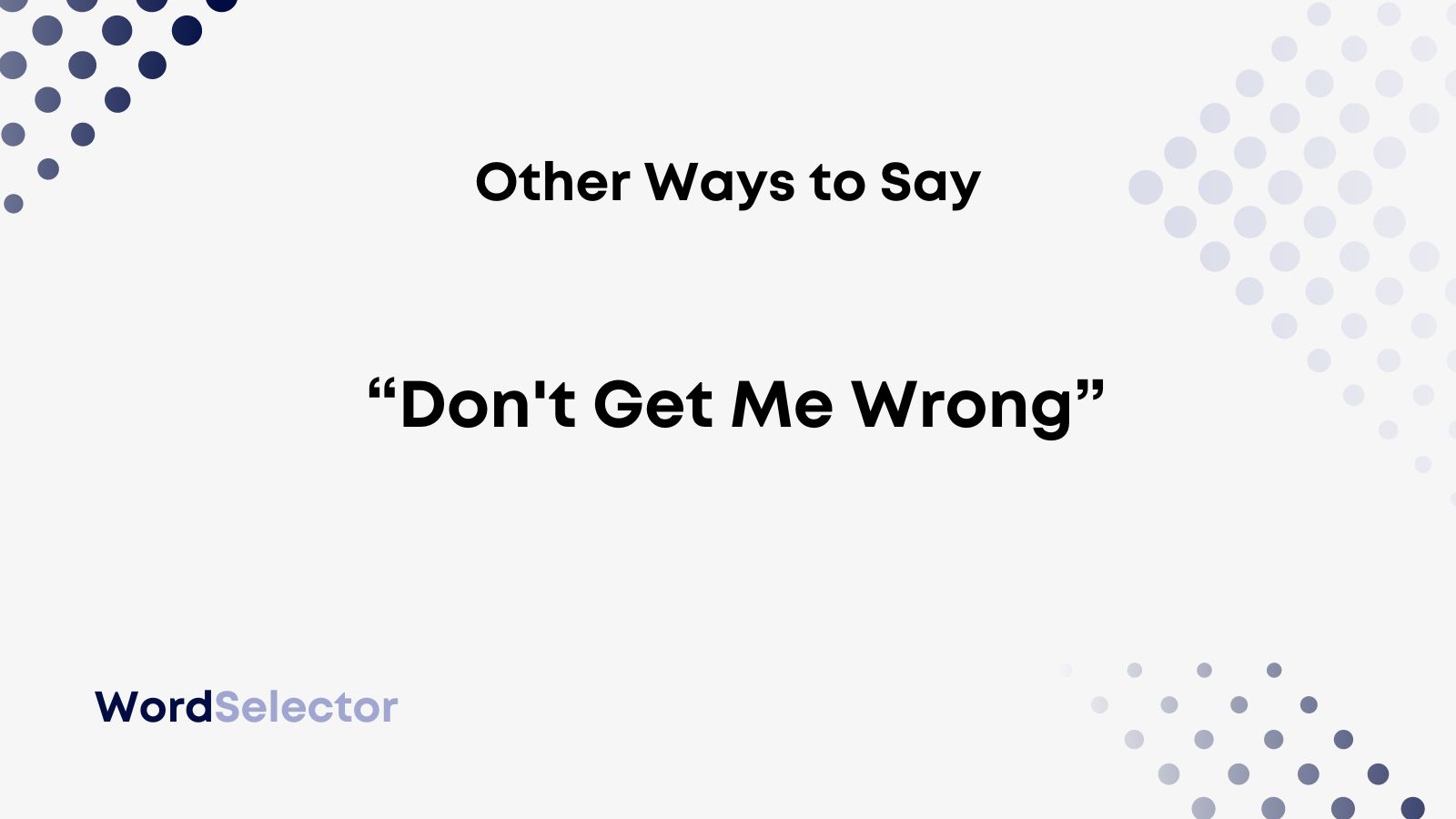“Don’t get me wrong” is clearly a more informal phrase. So, maybe you want something to add to your writing that’s more professional and polite.
Well, you’ve come to the right place! This article has gathered the best alternatives for “don’t get me wrong” that will mix up your writing.
Other Ways to Say “Don’t Get Me Wrong”
- I hope you don’t take this the wrong way
- Don’t take this out of context
- Please don’t misunderstand me
- Don’t mistake me
- Don’t take this the wrong way
- Listen to me on this
- Bear with me on this one
- I’m not saying… but…
- I don’t mean to be the bad guy, but
- Without sounding rude
- Hear me out
KEY TAKEAWAYS
- “Don’t get me wrong” is correct in informal situations, but it is not professional.
- “I hope you don’t take this the wrong way” is a great formal synonym to mix things up.
- Try saying “don’t take this out of context” if you want a more informal alternative.
Keep reading to learn more about the best synonyms. We’ve highlighted the two most useful ones to explain when you might get them to work.
Also, the final section explains more about “don’t get me wrong.” You can skip ahead if you think that’s going to be more relevant to your needs.
I Hope You Don’t Take This the Wrong Way (Formal)
“I hope you don’t take this the wrong way” is an excellent formal synonym. You can use it to show that you want to share a negative opinion but don’t want to offend someone.
It’s a common phrase used before providing constructive criticism. It lets people know that you might say something offensive, but you want to share an opinion that might help. Generally, you will follow up this phrase with a controversial idea.
You should try using it when emailing your boss. It shows that you want to help them understand something but worry that they might not take your opinion well.
Luckily, “I hope you don’t take this the wrong way” is a much more useful synonym formally than “don’t get me wrong.” We highly recommend using it in business emails to share opinions with colleagues or bosses.
Here are a few examples to show you how it works:
Dear Alice,
I hope you don’t take this the wrong way, but I think we should look into other options for the new position.
All the best,
Craig
I hope you don’t take this the wrong way, but I disagree with you entirely. We certainly have better options out there!
Don’t Take This Out of Context (Informal)
“Don’t take this out of context” is a great choice for informal situations. You can use it conversationally to show that you have an opinion to share.
Generally, it works best before criticizing someone. It suggests that you have something negative to say, but you want to say it positively. The aim of “don’t take this out of context” is to minimize the offense people might take from your opinion.
For example, you may use it when emailing colleagues outside of the workplace. It allows you to share an opinion with them before taking it further. That way, you can hear their thoughts and whether they agree before moving forward.
You can use “don’t take this out of context” formally as well. However, it’s more effective as an informal phrase, making it great to use instead of “don’t get me wrong” when you want to mix up your casual writing.
Perhaps these examples will help you:
Hey Stevie,
Don’t take this out of context, but I think Darren is wrong. We need to do something to change his mind.
Best wishes,
Suzie
Please, don’t take this out of context, but I’m not the only one who thinks you need help. We only say it because we care.
Is It Correct to Say “Don’t Get Me Wrong”?
“Don’t get me wrong” is correct, though it’s an informal phrase. You should avoid using it formally because it does not suit the tone.
For instance, you would not say “don’t get me wrong” when speaking with your boss. It’s not wise because it makes you sound far too conversational or overly friendly.
You should use a phrase like “don’t get me wrong” when speaking with a friend. It allows you to say something negative without them judging you for your opinion.
For example:
- Don’t get me wrong, I do like Daniel, but I think he has difficulty fitting in.
You should place a comma after “don’t get me wrong.” Then, you should justify your opinion before elaborating.
To help explain this, we can break down the previous example:
- Introduction: Don’t get me wrong,
- Justification: I do like Daniel,
- Elaboration: but I think he has difficulty fitting in.
This is the most common way to use “don’t get me wrong.” You could also include “please” before “don’t” to sound more polite.
Here is how to do that:
- Please don’t get me wrong
Feel free to bookmark this page to always have some synonyms ready to go. That way, you can refer to alternatives that might help to spice up your writing.

